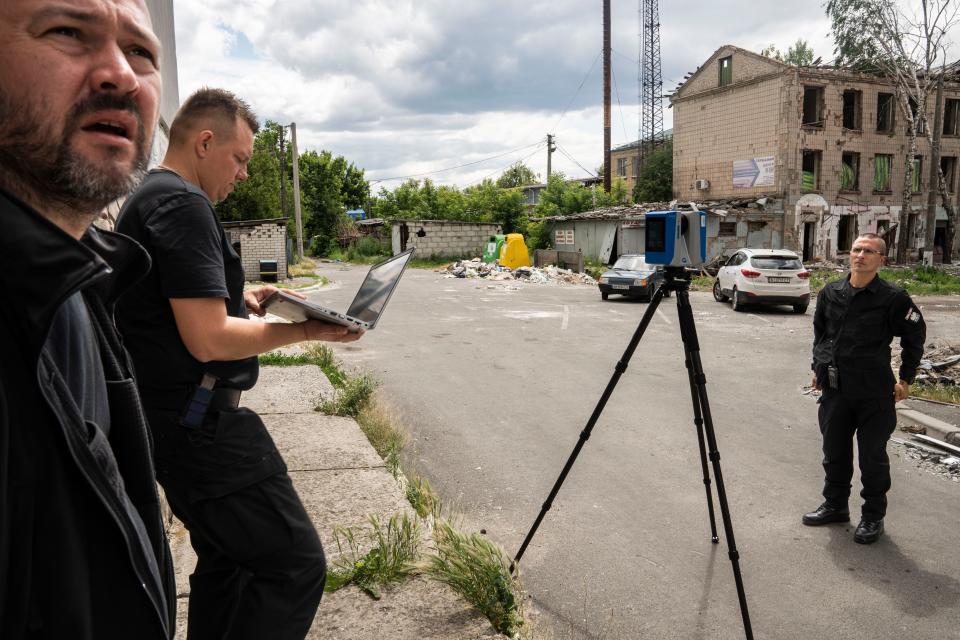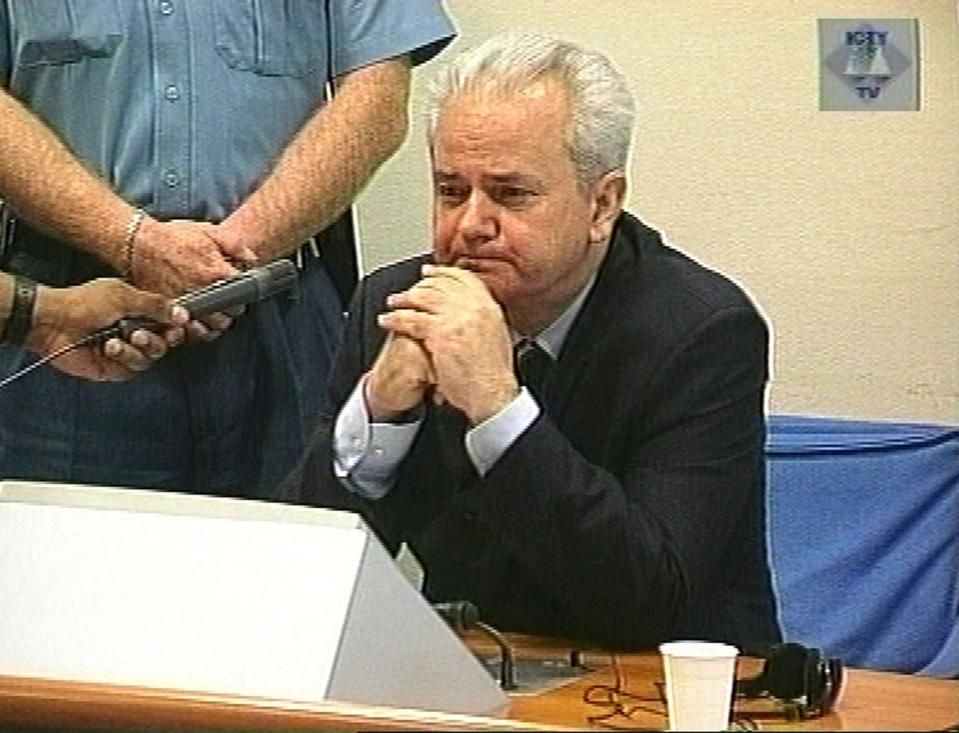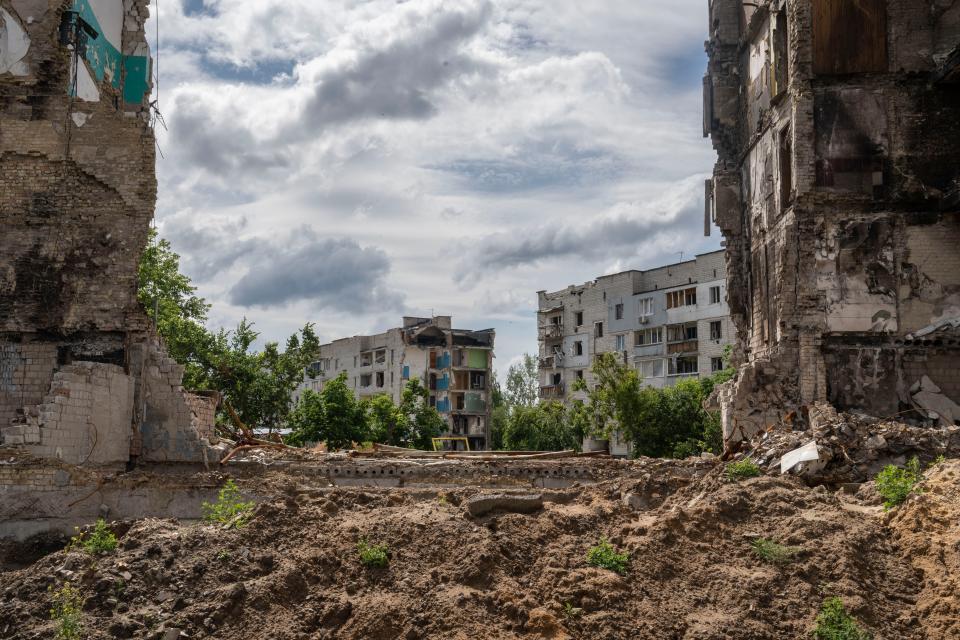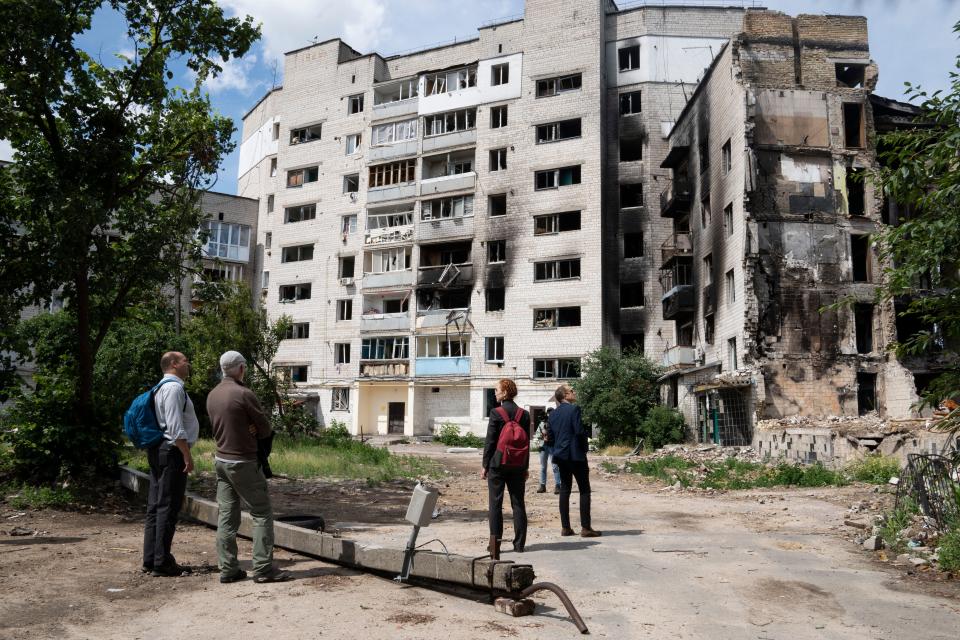War crimes trials could lead to international courts. But could they lead to Putin?
- Oops!Something went wrong.Please try again later.
BORODYANKA, Ukraine – The laser scanner beamed its rays up and down a stretch of troubled road. It had one aim: help lock up Russian war criminals.
In March, dozens of Ukrainian civilians died near this road in Borodyanka, a town about 50 miles northwest of the capital Kyiv, as tons of concrete and steel collapsed on top of them. They had been sheltering in the basements of apartment buildings struck by suspected Russian airstrikes and missiles.
Now, a Polish team had been deployed to Borodyanka with a sophisticated laser scanner to document the physical impact as part of war crimes investigations. These probes are ongoing – the number of cases expanding – as Russia's invasion of Ukraine turns 6 months old.
“This a technical but important tool to help us build up a digital picture of the destruction,” said Michal Kurowski, the prosecutor who was leading the team of specialist investigators. They spent a week in Borodyanka in late June scanning almost 5 miles of the town's streets block by block.

The scanner can capture 3D reality at a measuring rate of 7 million points per second – more than triple what is considered exceptionally accurate.
Each day, the scanner took about 3,000 pictures, which were then fed into a software system that created a simulated experience – virtual reality – of Borodyanka’s caved-in and crumbled buildings. The idea is that one day, prosecutors in a courtroom will be able to use these simulations to walk judges and juries around and within the bombed out apartment buildings as they consider war crimes evidence against Russia.
The Polish team's use of the laser scanner reflects the spectrum of approaches investigators are using to gather war evidence, which include scraps of ballistic evidence, witness testimony, open-source photos and radio intercepts.
Just as the investigations are wide-ranging, they could lead to a wide range of outcomes in the push for justice.
Courts of many possible varieties
Ukraine has chosen to pursue the majority of its war crime cases in its domestic courts, where it might, some experts believe, have more latitude to pursue convictions with evidence that falls short of international legal standards.
Beyond local courts, options for possible war crimes trials are broad. But each comes with its own complications:
The International Criminal Court in The Hague, Netherlands, does not try war crimes cases unless the accused is present in the court. Although Ukraine is already holding trials for some of the Russian soldiers it has captured, the country aspires to prosecute officials from Russia, such as commanders who launch rockets from across the border or who order other atrocities. But it could take years, if at all, before such senior perpetrators are identified or detained.
The United Nations has sent investigators to probe rights abuses in Ukraine. The U.N. convened such a war crimes tribunal to deal with wartime atrocities in the former Yugoslavia; that effort lasted more than two decades. But Russia's seat on the U.N. Security Council means it would almost certainly veto any similar attempt now.
Military tribunals held in Nuremberg and Tokyo related to war crimes during World War II were convened in military courts by the victors.
Other countries have opened their own investigations. They include many European countries, as well the U.S. Justice Department. But these cases focus on potential unlawful killings of their nationals in Ukraine. If the suspects are ever arrested, trying them in those national courts would hinge on a potentially lengthy extradition process.
At the top, little way to reach Putin
For now, Russian President Vladimir Putin and senior members of his government enjoy relative impunity.
As long as they stay in power, and remain in Russia or some other Moscow-friendly country, it will be extremely difficult to execute any arrest warrants to bring them before a global court, said Nigel Povoas, a British lawyer who has led the prosecution against some of the world’s most notorious international criminals and is now advising Ukraine's government on its war crimes cases.
Heads of state are often isolated from international justice, regardless of wartime atrocities.
Syrian President Bashar Al-Assad, for example, has evaded international justice despite more than a decade’s worth of evidence establishing how he has, with Russia’s assistance, bombed hospitals and schools, plunged large parts of the country into physical ruin and murdered tens of thousands of civilians.
The International Criminal Court issued an arrest warrant for former Libyan leader Moammar Gadhafi over alleged war crimes connected to anti-regime protests in 2011. He was deposed and executed by his own people before prosecutors could hold him to account in The Hague.
By the time the U.N.-established court connected to the former Yugoslavia dissolved in 2017, it had spent 24 years – 10,800 trial days – hearing 4,650 witnesses, examining 2.5 million pages of transcripts and delivering indictments against 161 people, including former Yugoslav president Slobodan Milosevic and the Bosnian Serb leader Radovan Karadzic. It took a 13-year manhunt involving the CIA and various U.S. special forces groups before Karadzic was brought to trial by a special criminal tribunal, also in The Hague.
There were major disruptions.

Slobodan Praljak, a Bosnian Croat general who was convicted of crimes against humanity while commanding his forces, killed himself in the courtroom by drinking potassium cyanide. His last words before drinking the poison were: "Slobodan Praljak is not a war criminal. With indignation, I reject your verdict."
The ICC does not hold hearings in August, when Europeans tend to go on vacation, but on any other day this summer, its courtrooms heard testimony related to war crimes allegations including torture, mutilation, hostage taking, genocide and crimes against humanity. Throughout June and July, these hearings were exclusively devoted to alleged war crimes connected to conflicts in the Central African Republic, Mali and Sudan. These cases stem from events that took place 10 to 20 years ago.
The chance of a top Russian official facing trial "all depends on the course of the war. If (Putin and others) remain in Russia, it may not be realistic. But if the war goes Ukraine’s way, they may eventually be able to be accessed and arrested,” said Povoas, who noted that Ukraine could, in its own courts, still seek to try some of Russia’s senior leaders in absentia.
Povoas added that in many ways, national courts are increasingly seen as the most effective places to try war crimes cases because they tend to be more efficient and more accessible to the needs of victims and witnesses. International legal settings require far more coordination, bureaucracy and funding.
“The wheels of International justice far too often have moved too slowly to meet the demands of victims and communities to see justice done within a reasonable time after their suffering was inflicted,” he said.
It is also expensive.
David Akerson, a former prosecutor at the U.N. atrocity trials connected to the former Yugoslavia, has estimated that each war crimes trial can cost around $30 million.
Kurowski said the scanner used in Borodyanka cost several hundred thousand dollars. Such devices had only recently been made available in Poland and he didn't think any of the other investigation teams in Ukraine, foreign or domestic, had one.
A city scarred by war
When Russia’s invading forces withdrew from Borodyanka in April, they left a shattered town. Some people are still missing.
Yet life has slowly returned.
A fruit-and-vegetable market has reopened in the town's main square.
As of late June, about half of its population of 16,000 people had come home.
But the once sleepy town still bears obvious scars: rows of high-rise apartment buildings cleaved in two, whole floors gutted by fire or with their entrails – sinks, ovens, air-conditioners – hanging upside down or at strange angles.
In the surrounding fields, mines are still being cleared.


Investigators like Glyn Morgan, a British criminal intelligence expert who is advising Ukraine’s government on its war crimes probes, regularly turn up in Borodyanka.
“The approach I always take is to try and understand what was the military logic behind what happened. Because if there is a military logic, then that often means that it isn't necessarily a (war crime),” said Morgan, who was observing a series of burned-out civilian buildings in town, half of which had been reduced to rubble.
“Unless those buildings had some particular military value in them, such as a Ukrainian army commander or an anti-tank or anti-aircraft missiles in there, they have no specific military value. So why would you even waste one of your own bombs bombing a target that isn't essential from a military perspective?” he mused.
Possible fallout for Putin
Putin’s concern over the war crime claims may be materializing in other ways.
In mid-June, Dutch authorities said they foiled a plot by a Russian spy to gain access to the International Criminal Court as it investigated allegations of Russian war crimes. According to Dutch intelligence, a Russian military intelligence officer named Sergey Vladimirovich Cherkasov used an elaborately constructed identity to try to infiltrate the court as an intern.
Cherkasov crafted an alias of a Brazilian man. He then used that fake name to apply for the internship. In his application, he spun a complex cover tale about growing up in poverty and how members of his family suffered from heart problems.
“If this person had gotten the chance to really work at the ICC, he could have gathered information, could have spotted sources (or recruited them) and could have gained access to the digital systems,” the Dutch intelligence service said in a statement.
“He might also have been able to influence criminal proceedings of the ICC.”
Cherkasov was arrested and deported back to Brazil.
Still, in a likely sign of Ukraine's impatience for justice, it might have already moved toward one other possible method of avenging war crimes: extra-judicial killings of Russian suspects.
Gen. Kyrylo O. Budanov, the country’s chief military intelligence officer, told USA TODAY that his operatives are hunting Russian military personnel believed responsible for war crimes in Ukraine.
He said these operations have also taken place inside Russia, successfully targeting mid-ranking Russian officers.
When confronted with these claims this summer, Ukraine's then-prosecutor general Iryna Venediktova said she found Budanov’s assertions “shocking.” Andriy Kostin, her successor, could not immediately be reached for comment.
"Amid the fog of war sometimes the Russians cannot clearly differentiate if a person just died in a battle or if there's been a targeted assassination," Budanov said.
Contributing: Jessica Koscielniak, Iryna Dobrohorska, Kostya Ilianok
This article originally appeared on USA TODAY: Russia's war in Ukraine: Will war crimes trials lead to Putin?

